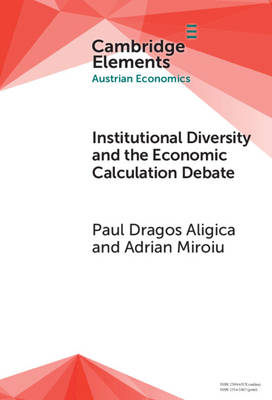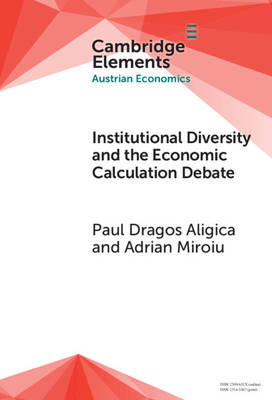
- Afhalen na 1 uur in een winkel met voorraad
- Gratis thuislevering in België vanaf € 30
- Ruim aanbod met 7 miljoen producten
- Afhalen na 1 uur in een winkel met voorraad
- Gratis thuislevering in België vanaf € 30
- Ruim aanbod met 7 miljoen producten
Zoeken
Institutional Diversity and The Economic Calculation Debate
The Feasibility Issue Revisited
Paul Dragos Aligica, Adrian Miroiu
€ 112,95
+ 225 punten
Uitvoering
Omschrijving
This Element brings together the problems of economic calculation, institutional diversity, and institutional feasibility, arguing that these themes are deeply interconnected and mutually reinforcing. Building on recent developments in institutional theory, political economy, social philosophy, and logical analysis, the Element revisits the classic debates surrounding alternative economic and governance systems. The discussion is organized around three core elements: (1) an overview of recent developments in institutional theory and social philosophy, that driven by technological advances have revitalized debates on alternative economic and governance systems; (2) a reexamination of the economic calculation debate, tracing its evolution from Austrian economics to a broader theoretical synthesis incorporating institutional political economy and conflict theory; and (3) a discussion of the formal, logical, and philosophical foundations for thinking about feasibility and realizability, offering analytical tools for evaluating the plausibility of institutional alternatives within specific historical and social contexts.
Specificaties
Betrokkenen
- Auteur(s):
- Uitgeverij:
Inhoud
- Aantal bladzijden:
- 80
- Taal:
- Engels
- Reeks:
Eigenschappen
- Productcode (EAN):
- 9781009677479
- Verschijningsdatum:
- 24/07/2025
- Uitvoering:
- Hardcover
- Formaat:
- Genaaid
- Afmetingen:
- 152 mm x 229 mm
- Gewicht:
- 281 g

Alleen bij Standaard Boekhandel
+ 225 punten op je klantenkaart van Standaard Boekhandel
Beoordelingen
We publiceren alleen reviews die voldoen aan de voorwaarden voor reviews. Bekijk onze voorwaarden voor reviews.







